Tags
Sudan
-
Update: Violence Subsiding
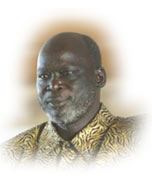 The violence following the death of Sudanese Vice-President John Garang (click here for details) appears to have subsided in recent days. While the official death toll stands at approximately 130, some reports say as many as 400 were killed. The death toll climbed as mobs of Arab Muslims raided Christian areas of Khartoum in retaliation for riots by southern Sudanese youth. Pray that the violence will completely cease and that Dr. Garang's dream of peace for Sudan will be realized.
The violence following the death of Sudanese Vice-President John Garang (click here for details) appears to have subsided in recent days. While the official death toll stands at approximately 130, some reports say as many as 400 were killed. The death toll climbed as mobs of Arab Muslims raided Christian areas of Khartoum in retaliation for riots by southern Sudanese youth. Pray that the violence will completely cease and that Dr. Garang's dream of peace for Sudan will be realized. -
Update: Talisman Accused of Cover-Up
The lawsuit by the Presbyterian Church of Sudan against Talisman Energy, a Canadian oil company, has taken a further twist. A sworn statement of a former Talisman employee claims that the oil company deliberately destroyed evidence of human rights abuses, allowed its airfields to be used by the Sudanese military in attacks against the south. The statement also claims that the company masqueraded security advisers as community development officers. Ian Taylor, Talisman's former manager of community development in Sudan, gave the sworn statement in September 2001. Tragically, he died of a heart attack last fall. In his statement, he wrote "I feel a deep sense of shame for not realizing Talisman's true objective earlier than I did and I experience daily nightmares based on fear for my eternal soul for the role I have played in the murder, starvation and displacement of the southern Sudanese people."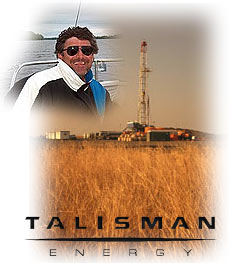 Ian Taylor, Former Talisman Employee
Ian Taylor, Former Talisman EmployeeAn Ontario Superior Court justice has also ordered Taylor's family to turn over all of Ian's correspondence and documents that might shed light on the case. While the lawsuit has been filed in New York, the Taylors live in Canada, which is why the church requested the involvement of the Ontario judge. The family only hesitated to release the documents until receiving a court order due to concerns of retribution from Talisman. The ruling can be viewed online.
-
Sudden Death of Sudan's Vice-President Brings Concern and Riots
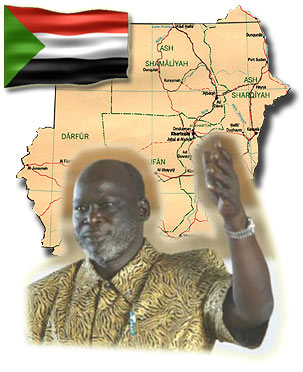 Former Sudanese rebel leader and newly appointed Vice-President, Dr. John Garang De Mabior, died in a helicopter accident on July 30. Dr. Garang led the southern rebels through the SPLA/SPLM and led in a negotiated peace settlement with the predominantly Arab Muslim Sudanese government. Garang was returning from Uganda with six colleagues when the Ugandan government helicopter went down in bad weather. All aboard were killed.
Former Sudanese rebel leader and newly appointed Vice-President, Dr. John Garang De Mabior, died in a helicopter accident on July 30. Dr. Garang led the southern rebels through the SPLA/SPLM and led in a negotiated peace settlement with the predominantly Arab Muslim Sudanese government. Garang was returning from Uganda with six colleagues when the Ugandan government helicopter went down in bad weather. All aboard were killed.Reaction to Dr. Garang's death puts the recently signed peace settlement in potential jeopardy. World leaders have called for a continuation of the peace process begun by Garang. Kenyan President Mwai Kibaki said, "The consolidation of the peace is the greatest honour the people of Sudan can bestow on the departed soul." Faith J. H. McDonnell, Director of the Church Alliance for a New Sudan, said, " It is our hope and prayer that, in spite of this staggering loss, the Sudanese people will go on to pursue the peace and freedom for all in Sudan for which John Garang fought." Grief-stricken supporters of Garang, however, have begun to riot in the Sudanese capital of Khartoum, blaming the government for Garang's death. The riots by thousands of southern Sudanese have left at least 36 people dead with substantial damage to property. Arab gangs have begun to retaliate, invading neighbourhoods of the mostly Christian southerners. A U.N. official told the Associated Press that a Muslim imam had been killed by southerners. "The situation is turning religious and that will be even more dangerous," he said.
The deputy leader of the SPLM, Salva Kiir Mayardit, has been named as Garang's successor and is calling for a continuation of the peace process.
Pray that this tragedy will not trigger a return to the violence and warfare that has left thousands dead in the predominantly Christian and animist southern part of the country. Pray for John Garang's wife, Rebecca, and the rest of his family during this time of grief. Speaking on behalf of The Voice of the Martyrs, Communications Director Glenn Penner said, "We are deeply saddened by the death of Dr. John Garang and wish to express our condolences to his wife and family. In my dealings with Dr. Garang, I found him to be a man committed to peace and religious liberty and we hope that his example will provide a model to the people of south Sudan at this time of grief and loss."
For more information on the difficulties facing Christians in Sudan,click here.
-
Update: Sudanese Class Action Lawsuit Continues Despite Canadian Government Interference
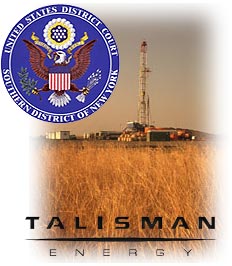 Talisman Energy, one of Canada's largest oil companies, is facing a class action lawsuit under the Alien Tort Claims Act in the United States District Court for the Southern District of New York. The suit claims that Talisman was complicit in genocide in southern Sudan by the Islamic Sudanese government; allegations strongly denied by Talisman. The Canadian government has also become involved in the lawsuit, as evidenced by a fax from the Canadian Embassy in Washington to the U.S. State Department, opposing the lawsuit. Despite this intervention and some setbacks (click here), the lawsuit is continuing.
Talisman Energy, one of Canada's largest oil companies, is facing a class action lawsuit under the Alien Tort Claims Act in the United States District Court for the Southern District of New York. The suit claims that Talisman was complicit in genocide in southern Sudan by the Islamic Sudanese government; allegations strongly denied by Talisman. The Canadian government has also become involved in the lawsuit, as evidenced by a fax from the Canadian Embassy in Washington to the U.S. State Department, opposing the lawsuit. Despite this intervention and some setbacks (click here), the lawsuit is continuing.Glenn Penner, Communications Director for The Voice of the Martyrs, believes that such Canadian government involvement is inappropriate. "How does it appear to the world when Canadian officials seek to interfere in a lawsuit concerning the possibility that one of our companies what complicit in genocide," asks Penner. "Hasn't Canadian oil development in Sudan cost us enough shame in the past? Let's allow the courts to do their job."
Pray that justice will be done in this situation. Pray that full and lasting peace will be achieved in Sudan. Pray for the many who are suffering as a result of the devastation by the Sudanese government against the people of southern Sudan.
For more information on Sudan and the challenges facing Sudanese Christians,click here.
-
Sudanese Constitution Signed Allowing Religious Freedom
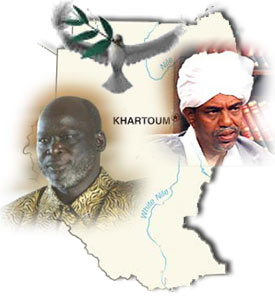 July 6 was an historic day in Sudan, as Sudan's National Assembly passed a new constitution, stepping back from full Islamic rule. John Garang, former head of the SPLM rebel movement in southern Sudan was also sworn in as vice-president on July 9, and he took leadership of the autonomous administration running the affairs of the predominantly Christian and animist southern region of Sudan.
July 6 was an historic day in Sudan, as Sudan's National Assembly passed a new constitution, stepping back from full Islamic rule. John Garang, former head of the SPLM rebel movement in southern Sudan was also sworn in as vice-president on July 9, and he took leadership of the autonomous administration running the affairs of the predominantly Christian and animist southern region of Sudan.For years Sudan suffered under the ravages of a civil war involving oil rights along with racial and religious differences between southern Sudan and the Muslim-controlled government. The civil war ended when peace talks finally brought a lasting peace accord in January 2005. Under the new constitution, Islam is recognized as the majority religion in the country, but notes the place of Christianity and traditional religions. Under the peace agreement, a referendum is to be held in six years to decide if southern Sudan will gain full independence.
Praise God for the progress that has been made in Sudan. Pray that religious freedom will be respected in all areas of the country and that Christians will be truly free to practice their faith. Pray for the leaders of Sudan, as they lay out the course for their country in the coming days.
For more information on the difficulties Christians have been facing in Sudan,click here.
-
Class Action Lawsuit Hits Roadblock
A New York federal judge ruled on Monday (March 28, 2005) that a lawsuit launched by the Presbyterian Church of Sudan against Talisman Energy Inc. could not proceed. The class action suit was filed two years ago on behalf of 250,000 non-Muslim Sudanese who were forcibly displaced to make room for Talisman's oil development in southern Sudan during the four years that the company worked there. The Presbyterian Church of Sudan was seeking damages that would have exceeded $1-billion in compensation to the victims. The judge ruled that the plaintiffs would be unable to differentiate which of the hundreds of attacks during a six-year period were caused by the Sudanese government's alleged campaign of genocide and rival fighting between rebel groups. She said that the core question in the case is whether the plaintiff's suffering was caused by the government's actions or Talisman's. This, she concluded, is fundamentally an individual question. If the lawsuit continues, it is expected that it will now only involve the seventeen Sudanese individuals directly named as plaintiffs. This will, of course, significantly reduce potential damages to Talisman.
Talisman Energy sold its stake in Sudan two years ago to India's ONGC Videsh Ltd., after intense pressure from human rights and religious liberty groups like The Voice of the Martyrs who maintained that Talisman was helping fuel Sudan's civil war and slaughter of civilians in south Sudan.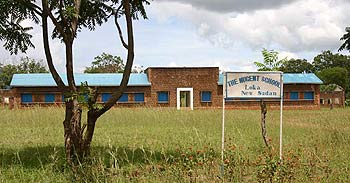 The Nugent School in Loka, Sudan
The Nugent School in Loka, Sudan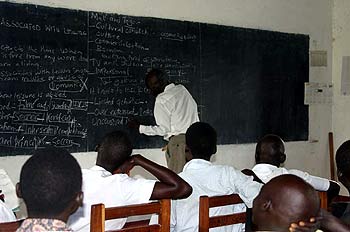
The Voice of the Martyrs is continuing to work in southern Sudan in rebuilding the lives of Sudan's Christians after so many years of war and persecution. In the last year, through the mission's Relief and Development Fund, VOM Canada has invested over $120,000 CDN in the establishment of a school in Loka, Sudan in partnership with Global Response Network. For more information on how you can help rebuild the lives of Sudan's Christians, contact us. Those in the United States are urged to contact Global Response Network at http://www.grnconnect.org/.
For more information on the difficulties facing Christians in Sudan, click here. A new music video featuring suffering Christians in Sudan is available in the Video section of VOM's multimedia website, www.vomcanada.com.
-
Darfur: A Religious Liberty Issue?
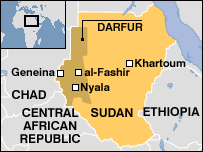 For many evangelical Christians, any news of war and suffering in Sudan immediately conjures up thoughts of persecution of black Christians by troops or militias loyal to Khartoum's Islamist government. Of course, I'm glad for this increased awareness, for when I joined The Voice of the Martyrs in 1997, almost no one had heard of the brutal persecution in this east African country. Thankfully, this lack of publicity has significantly changed in the last seven years, especially within the Christian community here in North America.
For many evangelical Christians, any news of war and suffering in Sudan immediately conjures up thoughts of persecution of black Christians by troops or militias loyal to Khartoum's Islamist government. Of course, I'm glad for this increased awareness, for when I joined The Voice of the Martyrs in 1997, almost no one had heard of the brutal persecution in this east African country. Thankfully, this lack of publicity has significantly changed in the last seven years, especially within the Christian community here in North America.So when news reports of the crisis in the Darfur region of western Sudan began to circulate and world governments began to pressure the Sudanese government to put an end to the conflict there, it was assumed by many that this was just a continuation of the war in southern Sudan. There are distinct differences, however, that need to be noted. The conflict in Darfur is between the Janjaweed, a Sudanese-government-supported armed militia recruited from local Arab tribes, and the black African peoples of the region. The conflict has been widely described as "ethnic cleansing" and that is very much what it is.
The conflict began in early 2003 after local rebel groups, the Justice and Equality Movement (JEM) and the Sudanese Liberation Movement (SLA) who had long accused the government of oppressing black Africans in favour of Arabs, attacked government forces and installations. The government was caught by surprise and had very few troops in the region and a large proportion of them were of Darfur origin. Given this, the government found itself in the position of being unsure whether it could trust many of its own units. Its response was to mount a campaign of aerial bombardment supporting ground attacks by an Arab militia recruited from local tribes and armed by the government, dubbed the "Janjaweed." While the conflict has a political basis, it has also acquired an ethnic dimension as civilians were deliberately targeted on the basis of their ethnicity. An insightful editorial by Salim Mansur in today's (August 18, 2004) London Free Press (click here) underlines the racial bigotry behind this tragedy and why the Arab world has not intervened on behalf of their black Muslim "brothers" in Darfur.
An economic dimension is also present related to the long standing competition between pastoralists (generally Arab) and farmers (generally non-Arab) for land and water. Religion plays a relatively minor role in this conflict, as both sides are predominantly Muslim. In fact, in a strange twist, the Economist reported in May that the Janjaweed were said to have "torched dozens of mosques and torn up and defecated on copies of the Koran." Hence, this present conflict cannot, in my opinion, truly be said to be a religious conflict. It is a human rights and humanitarian crisis, to be sure, but to seek to address it as a religious liberty issue would be inaccurate. This is why The Voice of the Martyrs has chosen to remain silent about this terrible tragedy.
It is not that we have not wanted to say something. It is not easy to watch such a travesty take place in a country which I have visited on a number of occasions and where we have invested a great deal of time and resources. But for over 30 years, The Voice of the Martyrs has had only one mandate: to serve the persecuted Christians worldwide. There are two key words in that mandate: Christians and persecuted. The crisis in Darfur only indirectly affects the few Christians in the region and their suffering has to do with their ethnicity more than their faith. If the believers there converted to Islam, it is entirely likely they would still suffer from Janjaweed attacks. The situation there also cannot be said to be one of religious persecution. The intolerance being demonstrated is not for religious reasons but for ethnic and economic ones. There is nothing that I have seen or read that would compel me to think that one side is trying to force the other to embrace another religious belief system, even a more militant form of Islam. I have often said that when persecution starts to mean anything, it will soon come to mean nothing. In my opinion, those who would try to link the Darfur crisis to a religious liberty issue run the risk of contributing to the watering down the concept until it means virtually nothing.
That is not to say, however, that Christians ought not to speak up against the atrocities going on in Darfur and seek to find ways to help. All human beings, created in the image of God, have the right to life, its necessities and freedom from abuse. These rights are being seriously threatened by the ongoing conflict in Darfur. There are a number of organizations involved in relief work in the region as any search on Google or Yahoo will reveal. We urge you to seek God's direction as to how you can respond.
For information on persecution of Christians in Sudan,click here.
-
Episcopal Church Evicted from Church Property
On May 20 at 9:00 a.m., Khartoum police served a court order to the Episcopal Church in Sudan (ECS), evicting them from their guesthouse which also served as their provincial office. Armed riot police were stationed outside to ensure compliance. To prevent any injury, the occupants vacated the building as ordered. The police then entered the building and ordered that all furniture, carpets and effects be removed from the premises. Trucks were brought in and everything was removed.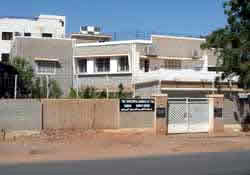
Episcopal Church in Sudan guesthouse in KhartoumAccording to a May 22 report from Middle East Concern, the problem began with Gabriel Roric Jur who had been removed as bishop in May 2003. Impersonating the archbishop of the ECS, Roric sold the property to an Arab businessman two months ago. As bishop, Roric had been originally named as trustee of the property when it was purchased in 1993 but refused to turn over the ownership papers to the ECS when asked to do so in 2002.
Criminal charges have been filed against Roric, accusing him of misrepresenting the church and impersonating the archbishop of Sudan. Church leaders believe that the government may be behind Roric's actions. Roric was widely believed to be an agent of the Sudanese security forces. Accusations that he had demonstrated over a long period of time a greater loyalty to the Sudanese security police than to the ECS led to his being defrocked as bishop in 2003. Roric continues to have significant contacts with government authorities.
On May 22, the Episcopal Church of Sudan sent an official protest letter to the Sudanese government. To read this letter, click here.
Pray that this issue will be resolved and that the property will be returned to the church. Pray that Roric will see the error of his ways. Pray that the church will be a testimony to those around throughout these difficulties.
For more information on Sudan and the challenges facing Sudanese Christians,click here.
-
Christian Woman Punished for Not Following Sharia Law
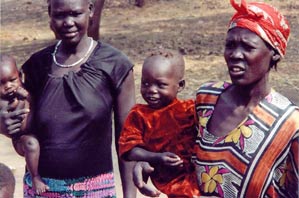
Christian women from Southern Sudan
One of the main topics of negotiation in the peace talks in Sudan has been the implementation of sharia law for non-Muslims. An April 28 news release from Compass Direct reports that a young Christian woman in the capital city of Khartoum was beaten and fined for not wearing appropriate head covering.
Cecilia John Holland was traveling on a transit bus on the evening of April 13 when ten public-order policemen stopped the bus and arrested her. When she protested that she was a Christian and from the south, she was struck in the neck and forced into a van with other women deemed to be dressed inappropriately. The next day she was taken to the Sizana Islamic Court where she was not allowed to speak in her defense. She was found guilty and sentenced to 40 lashes fined 10,000 Sudanese dinars ($50 Cdn).
The Khartoum government claims that the issue of sharia law in Khartoum and other primarily Muslim areas of northern Sudan has been resolved; that the southern leadership (the SPLM) have agreed to a single Islamic law in the north. This claim has been denied by an SPLM spokesman.
Pray that the peace talks in Sudan will succeed and that both sides will be willing to negotiate in good faith. Pray for Cecilia and other Christians living in northern Sudan, as they face the challenges of an imposed sharia law.
For more information on Sudan,click here. The Voice of the Martyrs has been actively ministering to Christians in Sudan for several years. Last January, as part of the mission's annual Operation Christmas Blessing, VOM carried out a major distribution of school packets for students in eastern Sudan. To view a brand new video report of the project go to our multimedia site, PersecutionTV (click here).
-
Peace Talks Resume
Talks to end the longest current civil war in the world resumed February 17 between the government of Sudan and the SPLM in the south. Speaking to AFP, both sides say they are determined to find a permanent resolution. This round of talks, which many hope will result in a final peace agreement, is scheduled to end on March 16. The focus of negotiations is on the status of three disputed areas, Abyei, Nuba Mountains and Southern Blue Nile, as well as political and administrative power sharing. There has already been an agreement signed on sharing oil revenues and a transition of power in southern Sudan leading to the right to self-determination for southern Sudan by 2008 as well as tentative agreements on the Nuba Mountains and Southern Blue Nile.
There are continuing concerns, however, that the government will stall the talks to prevent a final agreement which could erode their control over the oil-rich resources of southern Sudan, as well as the desire of many to create a strictly Islamic nation.
The twenty-year civil war between the predominantly Muslim north and the Christian and animistic south has killed at least 1.5 million people and displaced as many as four million others. Government forces have regularly attacked civilian targets, including schools, hospitals and churches, along with relief organizations providing aid to the victims of war in southern regions. The Voice of the Martyrs recently completed a major distribution of school supplies for students of two schools in the Upper Nile region of southern Sudan through their Operation Christmas Blessing program.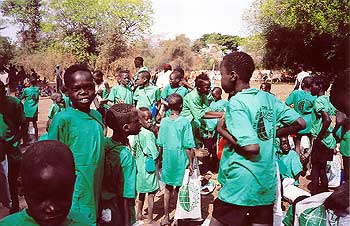
Sudanese students receive school supplies from VOM (Jan.2004)Pray that both sides will negotiate in good faith and that any hesitations or schemes to prevent peace will be thwarted.
For more background information on the situation in Sudan, go towww.vomcanada.com/sudan.htm.

